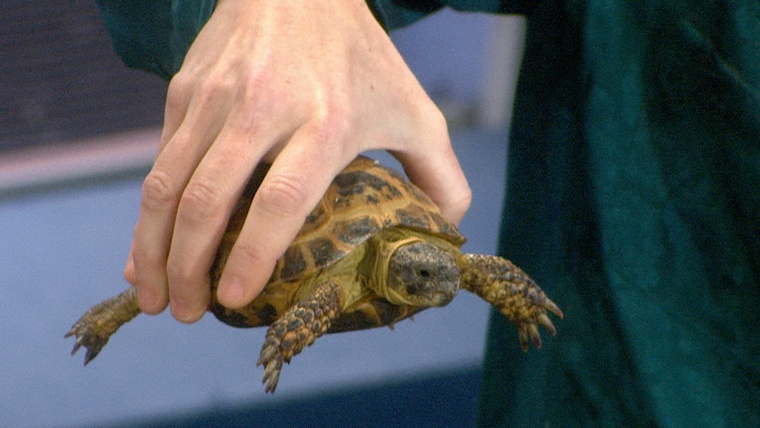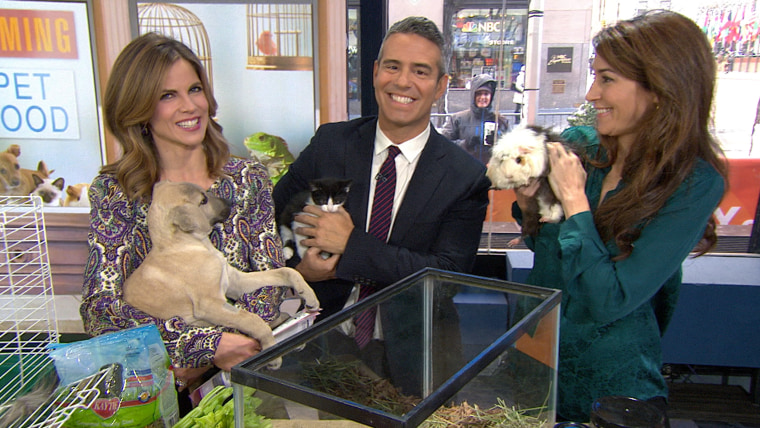To adopt the animals mentioned on the show, contact the New York Animal Rescue in Brooklyn.
Your kids may be begging you to extend the family with a pet. But, just because a species or individual animal is available for adoption doesn't mean it is appropriate for your family. Adopting a living creature should be given careful consideration so that you find the animal that is the best fit for your family.

Dogs: Dogs are one of the highest maintenance pets, as they require multiple walks a day, and plenty of time for play and training. In many cases, adopting an adult dog is a great choice. If you have young children, smaller dogs are generally not recommended, as they are generally less physically durable. Dogs typically live 11-17 years, and depending on where you live and the individual dog’s needs, you can expect to spend between $750-$2,000 per year on your dog.
Cats: One of the great benefits of cats is that they do their business indoors. Keep in mind that cats need to be provided with an outlet for their need to scratch and need plenty of attention to create a social cat that is comfortable with safely engaging with children. As with all animals, children should be supervised when playing with cats in order to prevent them from being scratched or bitten. The average lifespan of a cat is 13-17 years. Depending on where you live and the individual cat’s needs, you can expect to spend between $500-$1,500 per year on your cat.
Rodents: Some of the most popular rodents are guinea Pigs, hamsters, gerbils, mice, and rats. If scared, these animals may defend themselves with their teeth. Supervision is a necessity. Temperaments vary among individuals, so ask about their nature and handle them before you make a choice for your family. Also remember that little hands can hurt little creatures.
Hamsters: These creatures are nocturnal and will make good use of their exercise wheel at night. Gerbils are nocturnal and diurnal (day active), and rats are generally nocturnal. This means you will need to place their enclosure in an area removed from bedrooms. Guinea Pigs are naturally crepuscular (most active at dawn and dusk), but often adapt to the schedule of their humans and become diurnal (day active). They are generally more durable than hamsters and gerbils, and are highly social with people who handle them gently. Hamsters and rats tend to live about 2-4 years, mice about 2 years, and guinea pigs about 4-6 years. Depending on where you live and the individual animal’s needs, you can expect to spend between $200-$500 per year to care for your rodent.

Reptiles: If you work long hours, a reptile might be a good option. Be sure you are willing to supply them with the food they need to thrive. In the case of snakes, food is mice and other creatures. Most pet reptiles need a supplemental source of heat and some require a UV light. Depending on the species, turtles and tortoises in captivity can live 20-100 years. It typically costs between $200-$500 annually to care for a reptile.
Fish: Fish can be an ideal starter pet, especially lower maintenance fish such as goldfish and betas, which are comfortable living at room temperature. Fish can provide entertainment and even young children can help with feeding and with planning and readjusting the fish tank environment. While some fish can survive in a small bowl for a period of time, it is wise for their health to provide them with a tank. Goldfish can live many decades and up beta fish tend to live 2-5 years. Goldfish and betas typically cost about $50-$100 a year.
Birds: Some birds, such as parakeets, are relatively easy keepers. They can be playful, and are highly trainable, (some can even learn some words). Parakeets in captivity live approximately 4-10 years. Most of the larger birds, such as Amazon parrots, cockatoos and macaws, need specialized care and live for many decades. Plus, these birds can be highly vocal, which is generally not appreciated by neighbors in apartments with thinner walls. When choosing an area to place your bird’s habitat, remember that aerosol sprays and drafts are dangerous for them. Annual parakeet care is about $50-$100.
